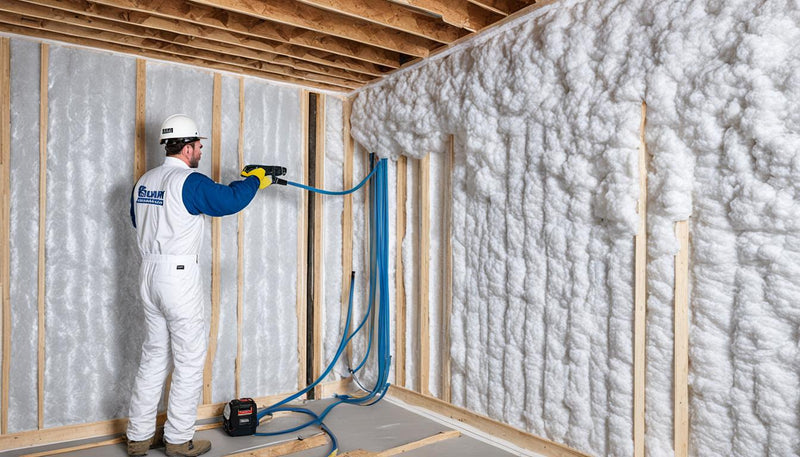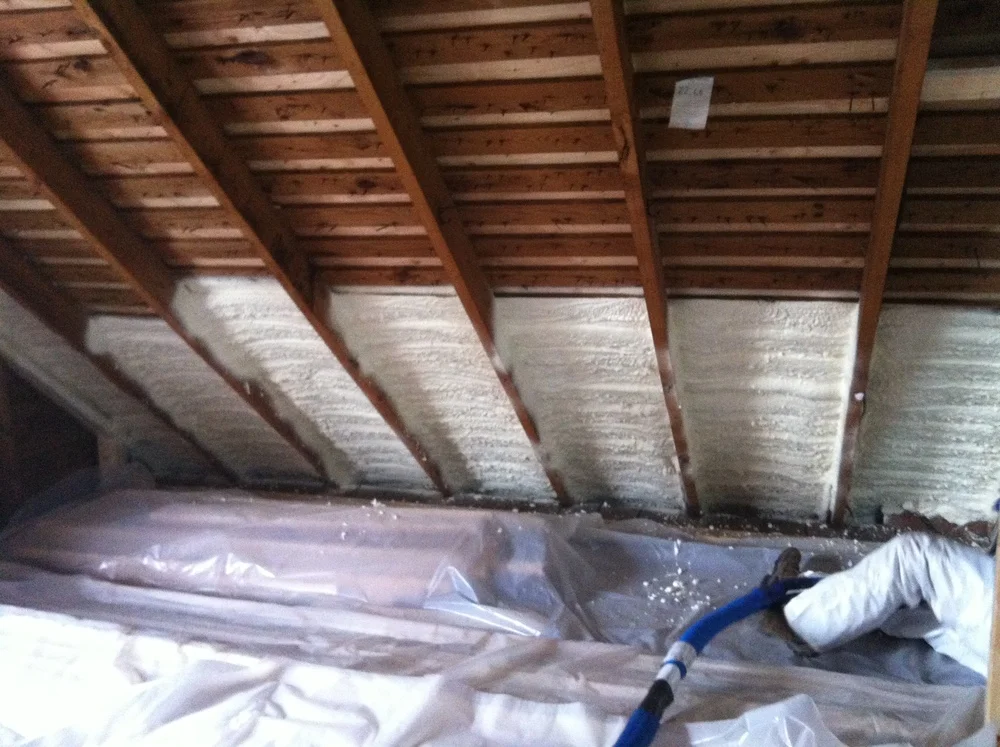The Environmental Impact of Spray Foam: Sustainability Considerations
The Environmental Impact of Spray Foam: Sustainability Considerations
Blog Article
Just How Spray Foam Can Improve Energy Effectiveness in Any Type Of Structure
Spray foam insulation has actually emerged as a pivotal service for boosting power efficiency across different building types. As residential property owners significantly look for sustainable remedies, the implications of spray foam insulation expand beyond plain utility cost savings.
Recognizing Spray Foam Insulation
Spray foam insulation is progressively recognized for its exceptional thermal efficiency and flexibility in various applications. Made up primarily of polyurethane, this insulation material is applied as a fluid that broadens upon contact, filling spaces and developing a seamless obstacle. This special residential or commercial property permits spray foam to satisfy uneven surfaces, making it an optimal option for both commercial and domestic structures.

Application of spray foam insulation is normally done by qualified professionals utilizing customized devices, ensuring optimal efficiency and safety and security - Spray Foam. The curing process is fast, enabling quick installation and very little interruption. As a result, spray foam insulation is increasingly being used in new building and construction and retrofitting tasks due to its capability to enhance structural honesty while enhancing total energy efficiency in buildings
Benefits of Energy Effectiveness
Energy performance plays a critical function in minimizing functional costs and decreasing ecological influence across different markets. By maximizing energy usage, home owners and services can attain substantial cost savings on energy bills, which straight enhances economic efficiency. Efficient power consumption implies much less dependence on fossil fuels, consequently adding to a reduction in greenhouse gas emissions and promoting a more lasting environment.
In addition, energy-efficient buildings commonly experience enhanced building values. As power expenses climb and sustainability ends up being a top priority for customers, residential or commercial properties with enhanced energy performance features are extra attractive on the market. This trend motivates financial investment in energy-saving modern technologies, which can further drive innovation and economic development.
Along with financial and ecological benefits, energy efficiency can also boost the general comfort and health of indoor rooms. Appropriate insulation and efficient heating & cooling systems aid maintain consistent temperature levels, lowering drafts and moisture degrees, which subsequently can cause much better indoor air high quality.
Inevitably, the advantages of power efficiency prolong past prompt financial savings, cultivating a resistant economic situation, promoting ecological stewardship, and enhancing the lifestyle for owners in any structure.
How Spray Foam Works
Usually applied as a liquid, spray foam expands rapidly upon contact with surfaces, developing a strong barrier that successfully secures cracks and spaces. This unique home is because of its chemical make-up, mainly being composed of isocyanates and polyols, which react when blended to produce a foam that adheres and loads spaces to different materials, including steel, wood, and concrete.
Once applied, the foam this contact form broadens to numerous times its original quantity, making certain a tight seal that prevents air leak. This process dramatically lowers thermal connecting, which occurs when heat transfers via materials, resulting in energy loss. The foam's high R-value, a procedure of thermal resistance, adds to improved insulation by minimizing heat transfer between the inside and exterior environments.
In addition, spray foam is resistant to wetness and pests, additionally boosting its effectiveness in preserving power performance. Its application can be customized to different areas, including attics, walls, and crawl spaces, optimizing insulation throughout a structure. Spray Foam. Overall, the cutting-edge design and application approach of spray foam make it a reliable remedy for enhancing energy performance in any kind of framework, resulting in decreased power costs and an extra sustainable my sources developed atmosphere

Applications in Numerous Buildings
Many applications of spray foam insulation can be discovered throughout numerous structure kinds, boosting energy effectiveness and comfort. In domestic homes, spray foam is typically used in attics and wall surfaces to create a seamless obstacle against air leaks, substantially reducing heating and cooling down needs. This application is particularly valuable in older homes, where typical insulation might be inadequate.
In business structures, spray foam insulation is related to roof covering systems and exterior walls, which helps to enhance thermal performance and shield against moisture intrusion. Its lightweight nature makes it an ideal choice for retrofitting existing frameworks without including considerable weight. Furthermore, spray foam can be utilized in industrial settings to shield pipelines and tank, keeping temperature level control for delicate products.
Institutional structures, such as health centers and colleges, gain from spray foam insulation by making certain a consistent indoor climate that supports occupant convenience and wellness. The versatility of spray foam allows it to adapt to different structure sizes and shapes, making it a recommended option for architects and contractors looking for effective insulation remedies. Generally, spray foam insulation functions as an essential part in achieving energy-efficient buildings across all industries.
Long-Term Expense Financial Savings
Spray foam insulation supplies significant long-lasting cost financial savings for structure proprietors and occupants by decreasing power usage and lowering energy costs. By providing an exceptional air seal, spray foam minimizes the infiltration of outdoors air, thus enhancing the thermal efficiency of a building. This causes much more efficient heating and cooling down processes, which can result in significant decreases in energy costs over time.
In enhancement to prompt savings on energy expenses, the resilience and durability of spray go now foam insulation add to its financial advantages. Unlike traditional insulation materials, which may sag, work out, or deteriorate, spray foam keeps its performance for decades, decreasing the demand for regular replacements or fixings. This durability equates to reduce maintenance prices and much less disturbance for passengers.
Furthermore, buildings geared up with spray foam insulation usually take pleasure in a boost in building worth, making them much more enticing to possible purchasers or renters. As power performance comes to be increasingly prioritized, buildings with effective insulation remedies stand apart in the marketplace. Eventually, the integration of spray foam insulation not only enhances comfort yet also stands for a calculated financial investment that produces considerable economic benefits over the long-term.
Final Thought
In final thought, spray foam insulation serves as an important component in boosting power effectiveness across varied structure types. Its capability to develop a smooth barrier versus air leak, combined with moisture-resistant residential properties and high r-values, substantially decreases power consumption and associated prices. The execution of spray foam not just adds to regular interior temperatures but additionally boosts property worth, highlighting its duty as a sensible investment for both household and commercial properties.
Spray foam insulation has actually arised as a critical option for improving energy efficiency across numerous building types. Spray Foam. As an outcome, spray foam insulation is increasingly being used in new building and retrofitting jobs due to its ability to improve architectural honesty while enhancing total power efficiency in structures
Overall, the innovative layout and application approach of spray foam make it a reliable option for boosting power effectiveness in any type of structure, leading to reduced power costs and an extra lasting developed atmosphere.
Various applications of spray foam insulation can be located throughout numerous structure types, boosting power effectiveness and convenience.In final thought, spray foam insulation offers as a vital part in enhancing energy effectiveness throughout diverse building types.
Report this page